Matador Network's Blog, page 2288
April 7, 2014
When your boyfriend proposes abroad

Photo: Tom Cappellino
I went to Oslo to work. I’d found a super cheap flight to Norway online, booked it, and then realized I was going to the most expensive country in the world. So I decided my time would be better spent working during the day instead of spending money. I rented an apartment in the Grünerløkka part of town, purchased some groceries so I could cook meals at home, and made a schedule of work-related goals to accomplish during the seven days I’d be there.
I think I ticked off maybe two things from that list. Because on my third day in Oslo, I heard a knock at the door.
At first, I was frightened. No one, apart from friends and family, knew where I was. I didn’t know anyone in Oslo, and the people I’d rented the apartment from were vacationing in the south of France. Why would anyone be knocking at my apartment door at 10:30am? And even if I answered it, would I be able to communicate with them? Oslo is known to be an incredibly safe city, but would I be the first murder the town had ever heard of?
Moving gingerly, heart beating quickly, I opened the door. Behind it was my boyfriend, Tom. I didn’t recognize him at first, because he sort of looks like every Norwegian man I’d encountered — 6’2″, pointed features, impeccably dressed, cheeks stung bright pink from the harsh winds outside.
“Can I help — um, what the fuck?!” were the first words to come out of my mouth as I realized who it was.
I could see the fatigue in his eyes from traveling overnight in a cramped airline seat. He smiled, and slowly lowered himself down to one knee. And then, it happened —
He proposed to me.
This is the guy who said he wanted to propose to me on the Jumbotron at a New York Islander’s hockey game.
My initial reaction was confusion. “What?!” I kept repeating. “What are you doing here?! I don’t get it, how did you get here?! WHAT IS GOING ON?!”
He hugged me from the floor, laughing. Later on, I realized I had forgotten to accept his proposal after ushering him into my flat, claiming that he must be exhausted from his trip and needed to rest. But I didn’t really need to say it, because he already knew the answer.
Tom and I have been dating for three and a half years. We’ve been friends since high school (I was his senior prom date), and after years of dating other people, we realized it was time we actually got together. We’ve been living together since 2012.
Tom doesn’t really travel, per se. He likes traveling, and wishes he could do it more often. But he doesn’t have the same amount of vacation time as I do. He enjoys his job as a hospital system administrator, and his priority right now is saving money to help us start our life together. We have to plan our trips very carefully, to fit his schedule. He’s also very cautious, and doesn’t like to make spontaneous decisions without thoroughly thinking them over.
When I’d asked him if he wanted me to buy him a ticket to Oslo, at $450 round-trip, his initial reaction was hesitancy.
“I’m not sure I can take off the time,” he’d told me. That was in August. The trip would be for the following March.
One of the best things about Tom, however, is that he lets me travel wherever I want, without question. When other couples hear about my solo travel plans, they’re confused. “Don’t you want to travel with him?” or, “I’d never let me girlfriend go anywhere by herself,” are the most common reactions I get.
But that’s not what Tom is about. He knows that if he were to keep me from doing the thing I love most, he’d lose me.

Photo: Tom Cappellino
We trust each other, which also helps. He knows he can let me go to Oslo for a week and I won’t cheat on him. Likewise, I know he would never take some random bargirl home and screw her while I was away. That’s something a lot of couples don’t have, but it’s what’s kept our relationship so strong.
Tom’s never really been a planner — he’s left that part of our vacations to me. So when he showed up at my apartment in Oslo, bags in hand and ready to kiss me, I couldn’t believe it at first. This is the guy who said he wanted to propose to me on the Jumbotron at a New York Islander’s hockey game.
I’m super glad he didn’t.
Words still can’t explain the depth of emotion I feel for Tom right now. Never in a million years would I have expected him to pull off such a romantic, unique proposal. But now I know he is capable of anything, and that his love for me goes beyond his customary hesitations.
We spent the next five days together exploring Oslo. We called our families over Skype to announce the good news (Tom had already informed them of his plans, and I still can’t believe they kept the secret for so long). I took my photo next to Norwegian artist Edvard Munch’s “The Scream”, showing off my engagement ring, which belonged to my grandmother. Tom used the free ring to justify his travel expenses.
“I knew this would mean more to you than an actual store-bought ring,” he told me. “I could have bought five trips to Norway for the price of one ring. And the way you score deals to travel, I knew this would be a better return on my investment.”
He was incredibly right. 
The post When your boyfriend travels abroad to propose to you appeared first on Matador Network.

12 sure signs you're from LA

Photo: Ian Broyles
1. You’re not from “Los Angeles.”
We’ve got a lot of pride in our city, but it’s second to a more localized loyalty. A team prefixed by Los Angeles wins a championship, sure, the whole town riots as one. But if somebody sits down in a bar next to a guy born and raised in LA and asks where he’s from, that guy isn’t going to say he’s from Los Angeles. That guy is from Santa Monica. Or Culver City, or West Hollywood, or any other individual city that makes up the megalopolis that is LA.
It’s not that we hate each other (although there’s a fair amount of snobbery that goes on). It’s just that Los Angeles as a city is so diverse that each neighborhood/city has turned into a niche, sheltering the inhabitants from the horrors of having to adapt to other people. It’s like the nation-states of Ancient Greece, with better hot dogs and worse drivers. America may be a melting pot, but Los Angeles is a box of chocolates, and the caramel doesn’t like being called the coconut.
Ignore this fact and you risk — shudder — being called a tourist. Or worse — a transplant.
2. Most conversations involve directions.
Everybody laughed when Saturday Night Live did “The Californians,” but people in Los Angeles sat confused for a moment, running the listed directions through their head and seeing if they made sense. It’s like an unconscious disease that’s wormed its way into our minds, where we constantly need to know the fastest way from point A to point B at any given time, because hey, you never know when Olympic will back up for a few miles when you’re trying to get home.
It gets worse in the car, where it’s nearly impossible to have a conversation about anything else. Picture this: a passenger consulting Waze, and two more debating with the driver whether going all the way to the 405 will save time. And that’s just on the way to the grocery store.
3. Traffic doesn’t really even bother you anymore.
On the other hand, sometimes you really can’t be bothered to take 40 turns just to get home after a long day of work. The 405 is packed, but there’s something Zen, something stereotypically Californian, about sitting in traffic with the window down listening to music without a care in the world.
Most people would get frustrated. Tourists gape at the prospect of taking two hours to drive 10 miles. Those tourists usually have a reliable public transportation system back home. Probably one that even takes them all the way to the airport, the spoiled bastards. Angelenos have had to deal their whole lives. Like a blind man whose other senses have had to work harder to compensate, Angelenos have learned to cope with the facts of life. Our sense of patience is working overtime.

Photo: noisemedia
4. But you’re still holding out hope for a subway to the sea.
We act like we’re not jealous of all those Londoners with Oyster cards and the Chube. We’ve adapted. But secretly, every time whispers go around about a subway extension (at least once a year), we turn into giddy little kids on career day dreaming about the day they become a fireman.
Oh, could you just imagine! Cheap and reliable service to LAX and Venice Beach! People have made dozens of imaginary maps of what it could look like, with so many lines and stops that construction wouldn’t be finished until the sun exploded. They’re the kind of drawings teenage girls do in their notebooks, only replace her future wedding dress with a way to get home from the bars that doesn’t include an angry taxi driver.
There are steps being taken nowadays. Legislation being passed, new stops being put in. But Los Angeles’ economy looks like Adam Smith and John Maynard Keynes straight up took a dump on it. There’s a 70-year backlog on potholes that need filling. Right now, that subway to the sea may be a fairy tale, something people born 10 years from now might one day enjoy. But there’s no shame in holding out hope.
5. You’ve accused somebody of being a transplant as an insult.
When somebody from Los Angeles gets mad, the first reaction is to call the offender a transplant — somebody who just moved to the city. To be fair, there are a shit ton of transplants here. Naïve blonde chicks from Ohio who skipped college to try and make it as an actress, and hey, they’ve got a casting session in the valley with some dude they met in a bar!

More like this: How to piss off an Angeleno
But it’s not exactly something to be ashamed of, and locals still use it as their go-to method to be as offensive as possible. The driver that cuts them off? Transplant. The guy who doesn’t know how to merge? Transplant. The idiots crossing the road when you have a green light? Better believe that’s a fucking transplant.
Half the transplants come out when you’re behind the wheel. The other half come out when you believe somebody is misrepresenting Los Angeles, forgetting the fact that in a city of 3 million people, there’s bound to be some differing opinions. There will probably be a transplant comment in the comments of this very article. To hear an average Angeleno tell the tale, there would be only five “real” Angelenos in the entire goddamn city.
6. You avoid Hollywood like the plague.
The Hollywood sign is an international icon. So are the Chinese Theatre and the Walk of Fame. With such a rich culture, steeped in the tradition of film and glamor, surely Hollywood must be the place to be for spotting the hippest celebrities and getting just a glimpse of the movie star treatment. Right?
Here’s the flaw in that logic: Why the hell would anybody, celebrities included, go someplace filled with people specifically trying to ogle their every move? There are two types of people actually in Hollywood. Transplants and tourists who didn’t think things through, and homeless people dressed as Spider-Man ready to stab them for taking a picture without paying.
Hollywood, especially Hollywood and Sunset Boulevards, is a bona fide shithole. Mr. Rogers’ star on the Walk of Fame is in front of a sex shop. All the glamor of the Academy Awards is an annual marketing machine. People from Los Angeles are at least aware of that.
7. You get unnaturally attached to mediocre local food joints.
A little over a year ago, Henry’s Tacos closed its doors. La-di-da, right? Except Aaron Paul of Breaking Bad tweeted out an attempt to save the restaurant, and people piled out in droves. There were petitions and sit-ins. More celebrities gave their support to the little taco stand in North Hollywood. Of course, it ended up being for naught — the shop still closed down — but the support and outrage was huge.
Here’s the thing: Henry’s Tacos was pretty standard fare. In a town like Los Angeles, you could throw a burrito in the air and hit a better Mexican joint. What made it special was the fact that it had existed in the same spot for 50 years. Remember that neighborhood loyalty we talked about way back up in #1? People are fiercely protective of neighborhood institutions, and when you grow up getting the same taco every Wednesday, you get attached. Nostalgia is a tasty seasoning.
Every Angeleno has a local joint they go to, and while it may not be their favorite — they might not even go very often — they would be devastated to find out it was shutting its doors. Let’s see a McDonald’s pull that off.

Photo: Courtney “Coco” Mault
8. But you still take friends from out of town straight to the In-N-Out near the airport.
…But that’s not to say we hate chains. In-N-Out isn’t some small local fare by any means — they’re in Texas now for God’s sake — but there’s something about the mystique of the secret menu and its refusal to franchise that makes it feel distinctly Californian. And it started just outside of Los Angeles, so we can at least pretend it’s ours.
By now, everybody’s heard of In-N-Out and the secret menu’s out, so when friends come to visit, they always want to try out the Animal Style they’ve heard so much about. One of the most convenient locations is on Sepulveda, just near the exit to LAX, so the line is always packed with foreigners wondering why the menu is so sparse and locals trying to get one last Double Double before they go away for a while.
You’d think there would be some kind of hipster effect, where Angelenos start to hate it as it proliferates outwards, but the food is just too good. I can’t stay mad at you, 3×3 Animal Style with Animal Fries.
9. You cringe at the word “hella.”
Los Angeles and San Francisco have a bit of a one-sided rivalry. San Francisco hates LA. They hate our better weather, they hate our “vapid culture,” and most of all they hate the Dodgers. Meanwhile, Los Angeles doesn’t mind San Francisco. The rain and fog is a nice break from the 364 days of sunshine we get a year. The Giants may win their share of baseball games, but Dodger Dogs are a damn good consolation prize. Nobody from LA will talk shit on San Francisco in any serious manner.

Read it: Why San Francisco hates Los Angeles
But there’s one thing we can’t forgive: the word “hella.” It’s nails on a chalkboard. If you’ve never heard it before, think of it like a synonym for “very.” So, “Dude, I’m pretty hungry,” becomes, “Yo, I’m hella hungry.” It’s just…why? The worst part is that nobody can explain why we hate it so much. We Angelenos say words that probably sound just as stupid to other people. But hella, man. It’s so, really, very annoying.
10. You get anxious at the prospect of jaywalking or parking.
When I first started going abroad, people would cross the street wherever the hell they wanted. I didn’t get it. They would run into the street right in front of cars, even police cars, as if they were playing a real life game of Frogger, and nobody batted an eye. I had to fight to swallow my anxiety before I could follow.
It’s not that I was afraid of being hit by a car. It’s conditioning. In Los Angeles, the police won’t hesitate to pass out jaywalking tickets to anybody brave enough to step off a curb before the little green man beckons from across the road. You laugh at that scene in Harold & Kumar. We nod in humble sympathy. Of course, we have a ton of unsolved crimes, but somehow passing out jaywalking tickets takes precedence. Gotta get that city budget back up to snuff, I guess.
It’s the same with parking. Whenever you park, you feel a biological compulsion to read through every detail of the ticketing times. When you’re abroad, these roughly amount to “don’t park here at night.” In LA, you can park on one side of the street every other day for two hours in the morning except Tuesdays which is one hour and every other day you can park for six hours but only if you have a permit. At a certain point, you just say “fuck it” and park elsewhere. And you’ll still come back to find a ticket left a minute after the time expired.
11. You’re fanatical about at least one of Los Angeles’ sports teams.
Maybe you’ve heard: Los Angeles has sports teams. And they’re pretty damn good. So good, in fact, that some of their best rivalries don’t even leave the city. Bryant #24 jerseys are so popular that half the people wearing them couldn’t name another player, and the Clippers handed the Lakers their worst loss in team history this year. The Kings won the Stanley Cup recently and single-handedly turned a city into hockey fanatics (bandwagon or not, the city loves its hockey). Without a professional football team, we’ve turned USC and UCLA into one of the greatest rivalries in sports, where people who attended neither pick sides.
Sports practically run this town. The very health and stability of the city hinges on whether or not one of our teams is in the running for the National Championship, and there’s gonna be a riot no matter the outcome. A city so broke it gives out jaywalking tickets will foot the bill for a parade if there’s a win.
Of course, this isn’t localized to Los Angeles. Everybody either loves us, or loves to hate us. But there’s something about getting free tacos in the Staples Center after a Lakers win that tastes oh so good.
12. You consider car chases a sport.
Speaking of being the national champions. Los Angeles is so good at car chases we have dedicated apps to let us know when they’re on TV. That’s when we crack a beer and cheer on our boys in blue as they zip through the streets in the ultimate contact sport. The news anchors are the announcers. The times the perp almost gets away are the touchdown plays. When the chase gets within a few blocks of your house, that’s a home game, and you better be craning your neck for a glimpse of the action.
Hell, OJ Simpson is our standing MVP in football and the chase.
It’s a morbid sport, sure. A lot of people aren’t into them. But like I said, people in LA are desensitized to traffic, and that includes the traffic hurtling 50 miles an hour down the wrong side of the road. In a town so driven by cars, you gotta insert a little levity into the equation. That’s the real mark of an Angeleno. 
The post 12 sure signs you were born and raised in Los Angeles appeared first on Matador Network.

On summitting Makalu

A heavenly sunset from Makalu La. All photos by author.
I’m not a mountaineer, nor do I ever intend to be — there’s far too much drama and death involved. I joined this alpinist circus a few years back and have only recently begun to grasp the consequences. Nonetheless, I am irresistibly drawn back for one more try, one more mountain.
I first came to Nepal in 1991. We did a one-month trek up to Makalu base camp. I remember thinking at the time that it would be completely insane to go any higher.
Fast forward to last spring 2013 — buckled into a helicopter with five others, we barrel through the misty Arun Valley. Hemmed in on either side by sharp impossible cliffs, we descend into Yangri Kharka, a one-hut town with a few chickens and even fewer eggs. The cold air blasts you the second you disembark, a splitting headache hits a couple hours later. We huddle in a smoke-filled room, joking about the endless varieties of dal bhat that we can look forward to. We’re all here for different reasons bar one: Each of us wants to summit Makalu, 8,485 meters above sea level, fifth-highest mountain in the world. Aside from that I’m guessing most are looking to unlock something inside, to reach a higher playing field in life. I can’t explain exactly why, but I know that I have to get to the top.

Performing pujaa at Advanced Base Camp.
A few days after reaching advanced base camp (ABC), some of us walk solemnly around the desolate moonscape, contemplating memorials of fallen climbers. Plaques and tin barrel tops are engraved with dates and names of those who never returned. A mutilated helicopter blade, another symbol of disaster, lies dejectedly on the ground. People die up here, more than I care to think about. There should be a sign with two arrows, one pointing up labeled “DEATH” and the other pointing down labeled “LIFE.” Each one of us knows that there’s a chance we might not make it back. No one other than myself claims to have a headache…yeah, right. I guess no one is afraid of what we’re about to get into, either. Stories of death and misadventure creep into our dinner conversations like uninvited guests. You’d have to already be dead not to feel the fear.
At some point death silently crawls upon your shoulder and waits to reach out and wrap its cold tentacles around you like a deep-sea monster. You feel it every moment, biding its time. Don’t worry, death is patient. Death will wait — it has all the time in the world.
And it seems as if you do, too. Too much time alone with your thoughts that keep spinning round and round like a pinwheel in a gale. A distant cousin, doubt seeps into your mind, haunting ambition. You can’t hide and must confront both or else they will destroy your resolve.

Highest elevation book sale in the world by the author.
I’m used to a solitary lifestyle. The last 20 years of my life have been spent, off and on, at sea, working on everything from commercial fishing boats in Alaska to luxury sailing yachts in the Caribbean. I’m used to the continuous days by myself, the monotony of long voyages, the never-ending game of “hurry up” and “stand by.” Most of the time it’s only you and your thoughts, same as here.
Weather is just as important. Sailors spend as much if not more time scouring weather data as mountaineers, cross-referencing and double-checking as many sources as possible before making a final decision to head offshore. As soon as you drop the lines and sail away into the deep blue water, you’re at the mercy of the weather. The same holds true the moment you leave base camp and head for higher ground. If a storm hits, you’re in it, for better or worse. Sometimes it feels as if you’re caught in a raging sea storm, peaks and ice transformed into massive frozen waves about to crash over you.
The first summit attempt began to go pear-shaped the moment we left Camp One. Departing too late in deteriorating weather, many of us didn’t make it to Makalu La until well into the night in snow flurries and gusting winds. Beyond exhaustion, we arrived to find that the Sherpas had only brought three tents for the entire expedition. Six of us had to cram into each three-man tent. Sleeping on top of one another, I managed to squeeze a few hours’ sleep past the squirming bodies, phlegm hacking, and driving winds.
I sensed some of the Sherpas had no intention of going further. Stilted English phrases like “Too windy, no chance” and “Too early, not enough rope” floated between the tents like bad omens. Who could blame them when their meager salaries could barely cover family expenses back home? Even so, we strapped on our headlamps and marched off into the long evening rays. Almost everyone wore oxygen masks, immediately sealed off in another world as if scuba diving. This high it doesn’t matter how many Sherpas or how many bottles of oxygen you have them lug along — in the end you’re all alone. If you start thinking somebody is going to come to your rescue, chances are high there might be a plaque at ABC with your name on it next year.
Black ice on top of fresh snow, a deadly combination, forced us to turn back that night. The next morning some members decided to bail. I weighed the possibility, but after a few hours of semi-sleep reconsidered. It would be four climbers along with some Sherpas. We set off in sunny afternoon skies and low wind. The weather forecast was favorable for the moment. As the skies darkened we reached the first ice wall. We were the first group up the mountain for the season and had no idea how much rope was still intact from previous expeditions…a big gamble.
Mr. Liu came up behind me with a ski pole in each hand. “Where is your ice axe?” I asked. “Didn’t bring it — don’t need it.” I begged to differ, but there was nothing he could do about it now. Hours passed as the Sherpas tried to locate the route and fix the first ropes. I dug out a trench in the snow and waited…and waited. I was getting a bad feeling. There was too much money on the table with only a pair of Jokers to show for it. It was taking them hours to fix the first pitch and we had no idea what lay ahead. Finally, I began to follow the footprints back and left my cards on the table. Was that it? Would I have another chance to roll the dice?

Arriving at Camp III for a brief respite.
The next morning, beat up and busted from three days at 7,400 meters, I set off for ABC with my Sherpa. No energy left, I pinballed down the mountain, slipping and sliding as I descended. My Sherpa raced further and further ahead, beelining for the hot plate of dal bhat that awaited him in the kitchen tent. Completely tapped out at Camp One, sans Sherpa, I decided to spend the night there alone as dusk settled in. This would not have been a problem if I had a lighter. No lighter meant no food and, more importantly, no water. I salivated as I stared longingly at the last remaining chunks of ice in my water bottle, cursing my Sherpa and hoping tomorrow would be a better day. Small simple things become so vital at high altitude.
Thoroughly dehydrated, I staggered into a solemn ABC the next morning. Liu was dead. The two climbers and Sherpa who made it to the top returned late in the afternoon, but their grim faces belied triumph. Everyone ate in silence. Liu was dead, another life swallowed by Makalu, nothing more needed to be said. This was the cost that each of us knew might have to be paid. The decision was made that evening to pull the plug. Everyone would be leaving…except me. I had unfinished business with this mountain.
There were now other camps as well, members ranging from exorbitantly rich sons and daughters of Indian socialites sporting extra Sherpas and an endless supply of oxygen to rock star soloists to ancient esoteric Japanese schoolteachers. One camp was chock full of public speakers, or “motivators” — it said as much on each one’s flashy business card, just below “Everest Summiteer.” Funny how everyone gets into the motivation business once they summit Everest. I guess it helps cover their mountaineering bills.
Days turned into weeks as the jet stream hovered over the summit like a worried mother, refusing to let go. Quarrels broke out among camps as egos flared and time ticked away. Soon the monsoon would set in — once that happened, all bets were off. I climbed up and down to higher camps, shaving minutes, then hours off my original times as my body became more acclimatized. Boredom set in as stacks of books and conversations were exhausted. Nothing to do. Breakfast to lunch to dinner to sleep…do it again. Time…somehow…sometimes…stopped.
And then the day came. I was ready…or so I thought. I had traded in my original Sherpa for another who favored my well-being over a hot plate of dal bhat. Older, stoic Dawa resembled a weathered sailor who had seen many a storm. He was all business and only said 20 or so words a day, but each one counted. If things got messy you knew that somehow he would be there, that he would get you out. But who was I kidding? With or without him, I was alone when it came down to it.
As we went up Makalu La one last time, we passed the vanguard who’d attempted the summit a few days before. A few made it, most did not. Conflicting reports of poor coordination and failure to bring enough rope trickled down the mountain with each passing body. We were the last group to go, the last ones to have a shot at the title.

Trudging above the French Couloir.
Dawa and I pitched our tent 100 meters above the others. We would leave just after midnight. After slurping down one last cup of tea and some noodles, I dug into my thermal cocoon and tried to calm my nerves, popping an Ambien for good measure. This was it…the final push.
Hours later Dawa rustled against me, then fired up the stove. Nothing like a warm cup of butter tea and some tsampa before heading out into a -40 C night…yuck! It took everything I had not to vomit. Altitude diminishes your appetite and it becomes difficult to eat, causing nausea similar to seasickness. It took everything I had to force down food and drink that I considered unappealing even in the best conditions. Even so, Dawa claimed it would give me the boost I needed to make it to the top, and I was not about to call into question his three previous summits.
Lights flickered in the camp below. Dawa and I muscled on our boots, readied our gear. As we adjusted our crampons, lights drew closer. Only two headlamps…two were not coming. “One of them is sick. Let’s do this!” shouted Sebastiano in his thick Italian accent. Now was no time to dawdle. Navigating up the first ice wall, Sebastiano abruptly doubled over. His Sherpa fretted. “I think I’m out, too. Go ahead, we’ll try and catch up.” We trudged steadily ahead, turning back a few times to watch the headlamps fade into the black.
Now there were only two of us. Doubt seeped into my mind. No time for thinking now, just get up that mountain. As dawn broke I moved to one side to snap a few photos. Suddenly the ground dropped out from beneath me and I was chest deep in a crevasse. I hauled myself onto firm ground with the help of Dawa as he scolded me, vaguely realizing that my life could have ended moments before. That’s all it takes up here, one false move. I could feel death nearby smacking its lips. Don’t worry, it’ll wait.
While climbing you have to know how to turn off the pain and go somewhere else. I dove deep into memories and traveled back in time. Comical childhood stories kept looping through my head as I grinned and chuckled to myself. You also have to learn how to break things into a million little pieces. If you think of heading straight to the top you’ll become overwhelmed. Whittle things down into tiny steps. Clip onto the next rope, make it to the top of the next ridge, check the next ice anchor…baby steps. Sometimes you have to drop down further into micro-increments, like opening a candy bar or changing a camera battery…or breathing. Can’t forget that. Anything beyond this level can be daunting.
The wind increased steadily as Dawa and I edged up over the French Couloir. This is where most of the others turned back. It seemed we were getting close, but where the hell was the summit? As if reading my mind, Dawa pointed off to a white peak in the distance. A new wave of energy surged through me. I had a visual. Everything became mechanical. Baby steps…keep moving…stop thinking…keep moving.

Approaching the summit is worthy of all the hurdles faced before.
I crawled up the final pitch, ice axe in hand, to find Dawa huddled down against pummeling winds. “We have to leave — I’m snow blind!” he cried. “Hunchha, ek chin!” After a few quick snapshots we regrouped and retreated. That was it, months of training and planning culminated in a few minutes of glory. The countless hours of preparation, the incessant fear and pain, if only to touch heaven for a moment.
I look back at those pictures now and still can’t believe I reached the top. Two little specs of flotsam that made it through a violent, frozen ocean and back. Reading about all of mountaineering disasters that have happened since then have made me aware of just how fragile we are in these deadly places where we don’t belong, but I know I’ll be back. I can’t explain exactly why, but I’ll be back. 
The post On summitting Makalu appeared first on Matador Network.

14 things to do in Utah post-skiing
IF YOU’VE BEEN FOLLOWING our series on skiing Utah and The Greatest Snow on Earth, you’ve met all 14 of the state’s resorts by the numbers, gotten breakdowns of the best ski runs and the sickest terrain parks, and seen some incredible photos that make you want to ski Utah right now.
But what happens at the end of your trip, once you’re skied out, your legs are aching, you’re rocking a full-on goggle tan? You could pack it up and head home, but you’d be missing out. Whether it’s tacking a few extra days onto an epic ski trip, going out on the town after last chair, or just coming to Utah during the spring shoulder season, when the snow’s still deep but it’s warm enough that you want to diversify and see what else is out there, here’s what you should be doing. 
 This post is brought to you by Utah, home of The Greatest Snow On Earth®. With 11 ski resorts less than an hour from Salt Lake City International Airport, there’s plenty of powder for the perfect ski vacation.
This post is brought to you by Utah, home of The Greatest Snow On Earth®. With 11 ski resorts less than an hour from Salt Lake City International Airport, there’s plenty of powder for the perfect ski vacation.

1
Singletrack slickrock.
Utah’s known for some of the most epic mountain biking on the planet. Just an hour and a half from the ski slopes, there’s tons of slickrock to ride—and not just the Slickrock Trail, which draws huge crowds in Moab. Gooseberry Mesa in Hurricane has 14 miles of technical slickrock and singletrack, with none of the crowds (yet). Plus, it has something else Moab doesn’t: mind-blowing views into Zion National Park.
Photo: Zach Dischner

2
Rock the stands at a Jazz game.
Once you’re done exerting yourself on the hill, go watch a bunch of other people do the same on the basketball court. Head to an evening Jazz game, where you can snag some nosebleed seats at EnergySolutions Arena for as little as $13. Yeah, so they haven’t been winning too many games lately, but pretzels, hot dogs, and showing a little support for the home team—that’s what sports are all about.
Photo: Bryce Edwards

3
Shoot the Wave.
Hiking to The Wave in Coyote Buttes North is one of the most mythical journeys in the United States. Limited to just 20 visitors per day, this is going to take a good amount of advance planning. For the best chance, enter the lottery for permits four months ahead of time online—they’ll let you know if you’re one of the lucky winners.
Otherwise, you can try for a walk-in permit. Show up at the Grand Staircase-Escalante National Monument Visitor Center in Kanab, before 9am the day before you want to go, to be considered for one of 10 permits. If chosen, you’ll be rewarded with a six-mike hike on an unmarked trail and the chance to be surrounded by flowing orange, red, pink, and yellow sandstone. It’s one of the most photographed landmarks in the United States, so if you don’t make it through the lottery, you’ll at least be able to live vicariously through those who do.
Photo: Raniel Diaz

Learn more: 20 things you didn’t know about Salt Lake City
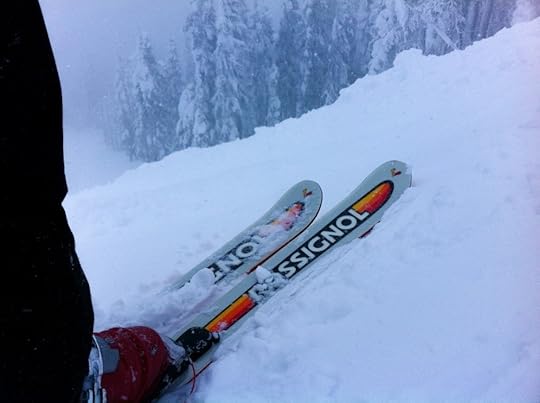
4
See how your skis were made.
Utah is home to several big names in the ski industry, including Rossignol and Black Diamond, but also a handful of smaller, independent manufacturers. DPS and Bluehouse are both making their innovative lines in Utah. Bluehouse, which launched in 2007 in Salt Lake City, even opens its doors to visitors curious to see how skis are made in their factory. Just give them a call or send an email to arrange a time—you’ll probably never look at your skis the same way again.
Photo: Alison and Fil
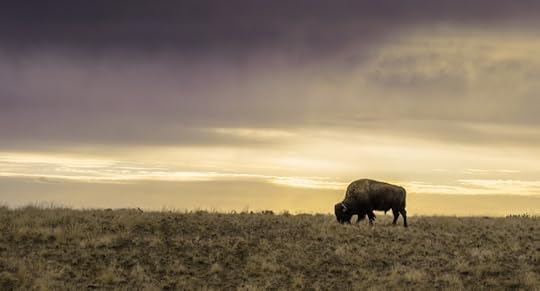
5
Go nature-watching at Antelope Island State Park.
Where else can you drive six miles into the middle of a gigantic lake and see herds of free-range bison? Antelope Island is 27,000 acres of the exact opposite of what you were looking at before you got on the island: no buildings, no cars, no suburbs. Just nature—a billion kinds of birds, mountains reflecting in the lake, bighorn sheep, mule deer, 360-degree views, and pronghorn antelope (obviously). March and April provide the best opportunities to catch a glimpse of bald eagles and bison babies.
Photo: JC Essentials ;)

6
Soak your muscles.
You can’t take a ski or snowboard trip without your body eventually screaming for an evening in the hot tub. (Bonus points if you have one that fits the whole crew, as above.)
For something a little more natural, seek out one of Utah’s many hot springs. Spring is a great time to hit up Fifth Water. Once the snow thaws on the road up to Diamond Fork Canyon, the 7-mile snowshoe hike in turns into a more reasonable 2.5-mile walk. The super-hot water here can get up to 108 degrees, but the pools sit alongside a running-water stream that helps to cool you down if the pots get too steamy.
Photo: Dan Olson

7
Catch a show.
What you may not know about Utah is that it’s literally the only big stop in the Intermountain West. This means epic bands from all over have to stop here on their way across the country. Not only that, but there’s a huge pool of regional talent out of Salt Lake City and the surrounding area, which means on any given night of the week, at any time of year, there’s a show you’re going to want to see. Most resorts host live music regularly, especially in the spring. Try the Owl Bar at Sundance for live local and national acts on the weekends. If that’s not your jam, there are a number of legendary live music venues in SLC, like The State Room, Kilby Court, Bar Deluxe, or Urban Lounge.
Photo: waves & leaves

8
Hit the skatepark.
Not ready to stop riding a board? Forget it! Utah’s surprisingly skate-friendly, with over 60 different parks spread across the state. For the perfect apres skate sesh, try the South Jordan park (aka Sojo) on S. Redwood Road, where the park stays lit for skaters until 10pm.
Photo: Ahmad Hammoud

9
Explore one of America’s premier national parks.
The national parks located in Utah all show off some of the most spectacular, ‘alien’-like landscapes on the planet. Combining a trip to one of Utah’s 5 national parks (Bryce Canyon, above, hosts free full-moon, naturalist-guided hoodoo hikes) with your spring break ski trip means you’re getting access to these incredible places minus the crowds (and the heat).
Photo: Paxson Woelber
Intermission
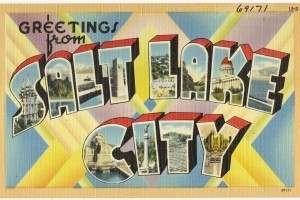
20 things you didn’t know about Salt Lake City
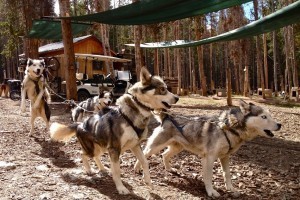
Why you should explore Breck in the off-season

The 5 sickest terrain parks in Utah
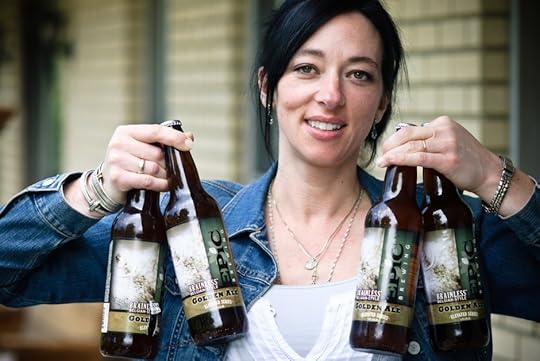
10
Take advantage of Utah’s craft beer revolution.
Utah loves craft beer. Epic Brewing in SLC gives tours of their brewery, followed by samples. Uinta Brewing also gives tours by (appointment only), and they have a brewpub where you can sample beers on tap before purchasing a few bombers to go. And, my personal favorite, Wasatch gives a Beer Tasting 101 course at their brewpub. That’s some post-ski education I can get behind.
Photo: Don LaVange

11
Get in some epic rounds of disc golf.
Base Camp in Moab is disc golf heaven. There very well may not be another place like it in the world—Martian scenery, rock towers, and one hole (13B, "The Chasm") traversing a huge drop. Base Campe is about an hour from downtown Moab, and you'll need 4WD to get here, especially in the winter. Camp out overnight for only $5/person.
Photo: Srikanth Jandhyala
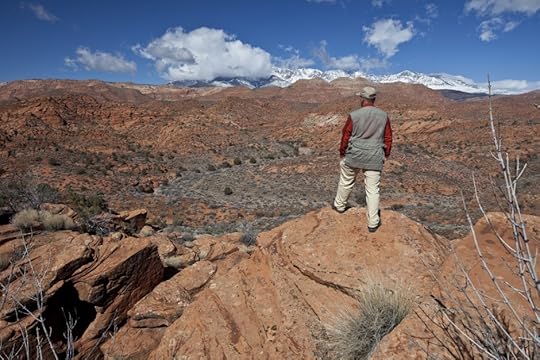
12
Followed by some epic rounds of 'regular' golf.
Head down to St. George for year-round and/or post-ski golf. Thanks to longer daylight hours in the springtime, you’re able to stretch your day with a twilight round of golf at one of the country’s craziest golf courses. Check out Sand Hollow—the red rock cliffs surrounding the course make it feel a little like you’re golfing on a different planet.
Photo: Bureau of Land Management

13
See petroglyphs and dinosaur fossils at Dinosaur National Monument.
Northern Utah’s been around much longer than we humans, and Dinosaur National Monument is proof. The Carnegie Quarry once held the fossils of 11 different species, including superstars from your childhood like the Stegosaurus and Apatosaurus (aka, the Brontosaurus). There are also many places throughout the park where visitors can view petroglyphs and petrography drawn into the surrounding rocks by the Fremont people at least a thousand years ago.
Photo: Helena Price

14
Or, just ski some more.
At the end of the day, when most resorts are calling last chair and skiers are falling over into hot tubs or spilling into apres bars, Park City, Brighton, Brian Head, Sundance, Powder Mountain, and Wolf Mountain are just getting revved up. Take advantage of empty slopes, stadium lights, and the mild spring evenings and just keep on shredding long after the sun has gone down.
Photo: dennis crowley
The post 14 things to do in Utah after you’re done skiing appeared first on Matador Network.

April 6, 2014
10 facts about Game of Thrones [vid]
GAME OF THRONES is set to once again dominate our television screens this year. I was lucky enough to hike on a glacier in Iceland where many parts of the show are filmed, but this video revealed to me many more unknown facts about where the show is shot, the animals used to play the direwolves, and of course, the show’s use of nudity, and soft core porn.
Culturally, Game of Thrones has changed the way we think about science fiction, and fantasy. I think it’s the first show I’ve ever seen that I don’t “trust” (meaning, it’s hard to invest myself in any single character, because they could die in the next episode).
It hass created new words, new memes, and a whole new way of traveling to places that seem so foreign, and yet, are the setting for where where King Joffrey got bitch slapped by his badass uncle, Tyrian Lannister. I’m not sure where season four will take me, but if there is more of that, yes please. 
The post 10 cool facts about Game of Thrones to get you PUMPED for the Season 4 premier (Video) appeared first on Matador Network.

21 colorful Texas wildflower photos
WE TEXANS TAKE OUR WILDFLOWERS SERIOUSLY, and not just because we’re treated to some particularly impressive blooms each spring. Much of the appreciation for wildflowers — and, more generally, native-plant ecology — we see nationwide today originated here in the state thanks to the work of Lady Bird Johnson.
Both during and after LBJ’s tenure in the White House, the First Lady promoted the study, distribution, and conservation of native plants in Texas and the rest of the country, helping found the National Wildflower Research Center in 1982, and the Lady Bird Johnson Wildflower Center in 1995, both located in Austin.
Texans today — organizations and individuals — have taken up the mantle, and if you’re in the state during wildflower season (mid-March through mid-May), there are tons of forecasts, sighting reports, and identification guides online that’ll tell you what’s blooming where. Here’s a peek at what you can expect to see during Texas wildflower season. 

1
Lost in a sea of bluebonnets
The bluebonnet is the Texas state flower, and if you visit during wildflower season, you'll likely see whole fields in bloom.
Photo: Donald Harper

2
Texas Indian paintbrush
Contrasting the violet-blue of the bluebonnets is the hot red of the Indian paintbrush, also known as prairie-fire.
Photo: QQ Li

3
Indian blanket
Another common Texas wildflower is the Indian blanket, or firewheel.
Photo: mlhradio

See more: 5 spots to enjoy spring blooms

4
Spiderwort
An up-close look at the spiderwort, which varies in color but most often manifests the blue hue seen above.
Photo: CameliaTWU
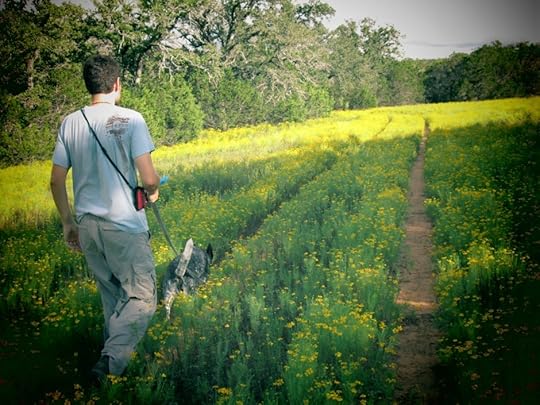
5
Bitterweed
Me and the dog on a walk in Pedernales Falls State Park. The bitterweed was out in force.
Photo: Author

6
Wildflower carpet
A great example of the mix of colors and species on display during Texas wildflower season. This shot was taken at Old Baylor Park, in Independence.
Photo: Dave 77459

7
Drummond's phlox
This species is native to Texas and is often sighted on roadsides.
Photo: Carol Von Canon

8
Goldenrod
This shot featuring a phaon crescent butterfly was taken near Grapevine Lake, in the DFW area.
Photo: Ken Slade

9
Willow City Loop
A little post-processing texture work turns this shot of the Willow City Loop (near Fredericksburg) into a work of art.
Photo: Vicki Gibson
Intermission

14 legendary natural wonders of South America

51 natural wonders so amazing it’s hard to believe they exist

The 54 best photos of 2012 [Matador edition]

10
Bluebonnet
Closeup of a bluebonnet off Highway 290 near Brenham.
Photo: Christine

11
Antelope horns milkweed
It's less the color of these blooms than the crazy fractalized geometry that's so striking.
Photo: QQ Li

12
Wildflowers in the city
You don't even have to travel out to the country to see Texas wildflowers. These were blooming in the middle of Austin.
Photo: Mark Stevens

13
Hill Country bluebonnets
An iconic Texas Hill Country scene: a field of bluebonnets, backed by the dipping limbs of a stand of live oak. This is one of those images that comes to the mind of a homesick Texas traveler.
Photo: Theodore Scott

14
Guadalupe County wildflowers
Taken near Seguin, TX.
Photo: Jack

15
Firewheels
A little macro detail of the firewheel, as seen above in photo #3.
Photo: Joel Olives
Intermission

25 natural wonders that will inspire you to explore

23 looks at New Zealand’s stunning geographic diversity

75 places so colorful it’s hard to believe they’re real [pics]

16
Bluebonnets
More bluebonnets standing tall in the Texas spring.
Photo: Hans Watson

17
Verbena field
Verbena blooms near Fredericksburg, TX.
Photo: Vicki Gibson

18
Bluebonnets in the fog
The morning fog makes the color of these bluebonnets pop even brighter.
Photo: Jason St Peter

19
Lupine
The name "bluebonnet" and the status of state flower of Texas actually encompasses multiple species of lupine.
Photo: faungg's photo

20
Sparse blooms
Not all years bring equally impressive wildflower conditions. The timing and concentration of blooms depend heavily on winter precipitation and the spring warmup. Fortunately, this year is looking solid so far.
Photo: Jonathan Phillips

21
Happy Texas wildflower season!
Come on down. We'll treat you right.
Photo: Jack
The post 21 insanely colorful photos of Texas wildflower season appeared first on Matador Network.

April 5, 2014
Animal photos magical, or creepy?
At first, I was just as enchanted as most of my friends who posted these photos, which were staged and shot by Russian photographer Katerina Plotnikova. Who wouldn’t be jealous of beautiful models who got to hug, and be caressed by, cuddly animals?
Some of them, like the portraits with the owl, and the foxes, are really quite beautiful. Looking through them again however, I realized that these are kind of creepy. The models look very young, and some of their expressions, and positions, are pretty sexual. I also had to consider the animals themselves — the shot could not have taken place without the help of on-site animal trainers, but were these animals drugged at all?
What is your opinion on Katerina Plotnikova’s photo set? Is this totally weird, or just another work of art? 
The post Is this animal photo shoot magical, or creepy? appeared first on Matador Network.

The humble history of GoPro [vid]
THIS IS GoPro Founder and CEO Nicholas Woodman. He wanted a product that did something specific for him, so he got creative. He started small, and he failed several times. Now his product is ubiquitous, right across some of the biggest companies in the world, down to the little itty bitty private consumer.
I’m what one may consider late to the party. I just picked up a GoPro Hero 3 Black this week for an upcoming roadtrip to Utah. I’m gonna be rock climbing, rafting, canyoneering, biking, hiking, and god knows what else you can get up to there, and I want to capture it all. As I’ve been fiddling with it over the past couple of days — figuring out settings, how to control it with my smartphone, how the mounts work — I’ve been falling in love with it. I get it. It’s not really hard to, considering many of my (and probably your) favourite videos on YouTube are shot with GoPros. Now, let’s see what I can actually do with it. 
The post The surprisingly humble history of the GoPro is an inspiration for us all appeared first on Matador Network.

The world's saddest art project

All images courtesy of Artarea TV, Tbilisi
MY WIFE AND I strolled quickly toward Misha Saakashvili’s presidential palace in Tbilisi, not knowing what to expect, but trying to look like we belonged. After BS’ing our way through security, we found the important, beautiful people and the local version of hipster youth milling around the palace grounds. We joined in, complaining about the poor quality of the wine, laughing slightly too loudly, and gazing at the art with as much ennui as we could muster in order to impress others with our cultural superiority. The Georgian media, as is its habit, swarmed, though the star had already left the building.
Misha (as he’s called) was not home.
The election in October 2013 ended Misha Saakashvili’s slow-motion fall from grace and power, though he hadn’t been in Georgia since well before then. The ‘Art Rules’ (or ხელოვნება მართავს) gallery opening was meant to repurpose “Misha’s house” for a night of contemporary Georgian art and culture. To say it was bad would be a compliment.
Granted, each installation did have a placard and the name of an actual, living artist, so in this sense it was art. My wife and I began our tour with the garden.
Exhibit A: The garden
1. Spray-painted “street art,” mostly faux-cursive tags and cartoonish aliens.
2. Two plywood skateboard ramps, two skateboards, no skateboarders, one placard.
3. Three fires burned low, pregnant with social critique, in three oil drums.
4. A meter-high ribbon of cloth wrapped around the palace’s neo-classical columns and printed with the words “MESSAGE EXPIRED OR NOT AVAILABLE.” Either the words actually meant something or they were just making English look very ugly.
Exhibit B: The palace foyer

1. Rusty spoons, aluminum foil, an empty instant coffee can, and other found objects tied to a plastic box with a tangle of rope and wires.
2. Twenty IV bags filled with nuts and berries, hanging symbolically near a staircase.
3. An installation generating ambient or industrial noises based on (maybe?) the motions of people in the room.
4. The strained, politically nervous dance of the crowd to this music. Maybe we weren’t ourselves art, but our struggle for purpose seemed to parallel the exhibit’s.
5. “Normal” paintings and photographs, mostly landscapes; possibly a critique on cultural invisibility or maybe just something Misha forgot to pack when he moved out.
Exhibit C: The second floor
1. A sculpture of a giant charred and toppled flower occupying most of one room and some of the walkway stretching over the foyer. A few people tripped over it and looked around confused, like they didn’t know if they were guilty or not. Maybe being tripped over was part of its deeper statement about the human condition. Or maybe not.

2. Three white couches, each with one very intentional line of dirt running along its cushions. My personal favorite, though of course I have no idea what it meant.
Exhibit D: The garden (again)
1. A drainpipe that was apparently more than merely a drainpipe. According to the piece’s label, it symbolized the breakdown of Misha’s stranglehold on information. I spoke directly to the placard with a rather funny Georgian expletive that through the magic of grammar makes part of the male anatomy into a state of being. It doesn’t translate well, but it’s a favorite among seventh-grade boys.
2. The nighttime panorama of Tbilisi, which was not part of this ‘Art Rules’ chaos, but certainly would take First Prize for beauty. Misha sculpted a great view for himself during his tenure as president, spreading a legacy of fountains, bright colors, and bizarre architecture below his clifftop abode. He built his walls high enough to block out the decaying, slummy neighborhood surrounding its other three sides, limiting his field of vision to the city below, the sky above, and Sameba Cathedral behind.

‘Art Rules’ was supposed to show that the emperor has no clothes, though it seems many of his more artsy subjects don’t either. My impression as we hurried to catch the metro home was that it was all a huge joke. The artists and event organizers thought they were giving Misha the finger by turning his house into an art gallery, not realizing that filling Misha’s house with their flaccid works of art was itself the finger.
It’s a sad joke: the site of years of political waste and official kitsch filled with artistic kitsch, the whole event merely a continuation of the former regime’s ennui and impotence. Even though the king has left his castle, his subjects are still pissing on his shadow. Kinda reminds me of another famous Georgian named Joseph. 
The post Inside the world’s saddest art project: Georgia’s Presidential Palace, Tbilisi appeared first on Matador Network.

April 4, 2014
Illegal Norwegian street sign
I LOVE COLLECTING photos of interesting street signs while traveling abroad. Some are pretty self-explanatory, others are more cryptic, but very rarely have I found a sign as hilarious as this one in the Norwegian town of Ørje. Apparently, it violates the Norwegian Road Traffic Act, and I can see how it could interfere with pedestrian safety. But imagine how fun it must be to watch people using this crosswalk; when it rains and snows as much as it does in Norway, it’s nice to have things like this to inspire creativity. 
The post This Norwegian street sign is illegal, but what it makes pedestrians do is hilarious appeared first on Matador Network.

Matador Network's Blog
- Matador Network's profile
- 6 followers



